After nearly 40 years, for a second time in less than a month, a group of women have been allowed into Tehran’s Azadi Stadium to watch football.
On November 11, the Ministry of Sports handpicked a group of women to watch the Asian Champions League final between Iran’s Persepolis FC and Japan’s Kashima Antlers.
Women have been banned from sports stadiums in Iran since 1981, two years on from the Islamic Revolution. But the dubious honor of being the first to bar women does not go to religious authorities or to extremist mullahs, it goes to Tehran’s Shiroudi Stadium. A domino effect followed, until all stadiums in Iran became the exclusive domain of men, supported and encouraged by religious authorities. Ayatollah Ruhollah Khomeini, founder of the Islamic Republic, Ayatollah Naser Makarem Shirazi and Ayatollah Lotfollah Safi Golpayegani were three of many senior religious authorities to oppose the presence of women in stadiums.
Enter the “White Scarves”
But 2004 witnessed the launch of a campaign by Iranian women called “White Scarves.” Women’s and human rights activists set out to regain women’s right to attend sporting events at stadiums, staging rallies outside stadiums and asking people to sign petitions in support. The most significant White Scarves rally took place in 2005 outside Azadi Stadium before a football match between the national teams of Iran and Bahrain. On that day, Mohsen Mehr-Alizadeh, who was the head of the Physical Education Organization, the predecessor of today’s Ministry of Sports and Youth, under President Mohammad Khatami, allowed around 100 handpicked women into the stadium.
Mehr-Alizadeh’s decision had a lot to do with boosting his chances as a candidate in the 2005 presidential election, which Mahmoud Ahmadinejad eventually won. The women who were allowed into the stadium on that day were relatives of the members of Iran’s National Football Team, movie actresses and employees of the Physical Education Organization.
Gathering outside the west gate of the Azadi Stadium, the White Scarves demanded that all women should be allowed to enter the stadium, not only handpicked ones. But their efforts got them nowhere. Iran won the game and qualified for the 2006 FIFA World Cup in Germany, but women were not allowed to witness the victory — though they made sure they participated in the celebrations out on the streets.
Since 2009, however, international federations and the International Olympic Committee (IOC), have been putting applying more forceful pressure on Iran to allow women into stadiums. The IOC’s charter states: “The enjoyment of the rights and freedoms set forth in this Olympic Charter shall be secured without discrimination of any kind, such as race, color, sex, sexual orientation, language, religion, political or other opinion, national or social origin, property, birth or other status” [PDF]. These “rights and freedoms,” of course, apply to both athletes and the general public.
No Women, No Games
In 2011, the International Football Federation (FIVB) became one of the first international sports federations to officially lodge a protest against Iran for its ban on women entering sports stadiums. Iran had hoped to host the world championship volleyball games, but the FIVB’s first condition was that Iran must allow women spectators. Despite this objection, Iran’s Volleyball Federation resisted.
In 2014, Minky Worden, the Director of Global Initiatives at Human Rights Watch (HRW), told IranWire that any discrimination is incompatible with membership to the Olympic movement. “We wrote a private letter [PDF] to the FIVB in the fall to ask them to take a stand on non-discrimination because volleyball is part of the Olympic family,” she said. The letter specifically asked FIVB to look into the ban on Iranian women being spectators during the international volleyball games in Tehran.
In 2012, the FIVB had signed a convention that committed it to observe and enforce the basic tenets of human rights. Worden told IranWire that the FIVB had promised to oppose any discrimination that violates the spirit of the Olympics. And the FIVB increased pressure on Iran’s Volleyball Federation, threatening that Iran could lose the privilege of hosting international competitions and even face suspension from the international federation.
During the 2014 international competitions hosted by Iran, Mohammad Reza Davarzani, the president of Iran’s Volleyball Federation at the time, once again resorted to the practice of choosing a token group of women to watch the games. The federation selected women from among the police and the employees of the security departments of various sports federations. For each game, approximately 50 women were handpicked to enter Azadi Stadium, while hundreds of women were kept outside the gates that were closed to them.
Bypassing the Ban
Over the last two decades, however, Iranian women have been finding ways to sneak into stadiums. Some have disguised themselves as men in order to watch the games, and have successfully infiltrated Azadi Stadium — the subject of the acclaimed 2006 movie Offside by Iranian director Jafar Panahi. Unsurprisingly, the film was denied a distribution permit in Iran for a long time.
Some opponents of women's right to attend stadiums present the ban as a measure to protect women from rough and rowdy men, but women’s experiences do simply not support these arguments. Zahra Khoshnavaz, a poet and a writer, has successfully snuck into Azadi Stadium three times. Each time she has documented her success, posting on Instagram photographs of herself in the stadium disguised as a man. “Those around me found out that I was a woman and this changed their behavior,” Khoshnavaz told IranWire. “The men around me sprang into action immediately. One of them took off his jacket and draped it across my shoulders. Another put his hat on my head and told me: ‘Don’t look at anybody. Keep your head down.’ Those who were sitting in front of me closed ranks to hide me from agents who could be sitting further down.”
Zahra Khoshnavaz also said the predictions of “men’s dirty mouths” never came to fruition. “We are told that men go wild when they are not controlled, but I saw only humanity. When they found out that I was a woman, they even talked differently.”
As 2018 got underway, the International Football Federation [FIFA] stepped up its pressure on Iran to lift the ban on female spectators. During his visit to Iran in March, FIFA’s President Gianni Infantino met with President Rouhani and raised the subject. “I was promised that women in Iran will have access to football stadiums soon,” he said afterward. He also said he had been told than in some countries, Iran included, it was impossible to make such a change with immediate effect, suggesting he and FIFA had a degree of patience with the issue. But Infantino also said if women were not allowed into stadiums, FIFA would have to take harsher measures against the Islamic Republic.
In order to appease FIFA and to escape possible fines, on October 16, 2018, the Iranian Football Federation allowed a small contingent of 150 handpicked women to attend a friendly football game between Iran and Bolivia at Azadi Stadium.
“It’s a sin!”
But even this small gesture met with immediate harsh criticism from conservatives, including Ahmad Khatami, Tehran’s Friday prayers Imam. “When a woman goes to the stadium and sees half-naked men, it's a sin,” said Mohammad Jafar Montazeri, Iran’s chief prosecutor, the day after the game. "The presence of women in stadiums is harmful and there's no religious justification for it.” He warned that action would be taken "if such moves continue.”
But the pressure from FIFA and the presence of two high-level international and Asian football officials in Tehran made it difficult to balance the demands of the conservatives and some clerics with the conduct FIFA required. On Saturday, November 10 Gianni Infantino and Sheikh Salman Bin Ibrahim Al-Khalifa, President of the Asian Football Confederation (AFC) traveled to the Iranian capital to watch the game between Persepolis and Kashima Antlers. The Iranian federation knew it had to show that it was allowing women into stadium, and the handpicked “solution” was once again its answer.
In the days before the AFC Champion League final, the Football Federation and the Ministry of Sports began identifying and selecting around 800 women to watch the game at Azadi Stadium. A section of the south side of the stadium was designated and roped off for women so that they would not be sitting close to men. The selected women were chosen from among reporters, employees of the Ministry of Sports and the football federation, members of Persepolis Fans Society, and members of various national sports federations.
According to reporters present at the scene, immediately after entering the stadium, Gianni Infantino asked Mehdi Taj, head of Iran’s Football Federation, about women being able to watch the match. Taj invited him and Sheikh Salman to visit the special section set aside for woman spectators. While they were visiting the section, Iran’s state-run TV stopped broadcasting live from the stadium.
A number of reporters at the stadium tweeted that when Infantino was visiting women’s stands, men spectators started chanting “Lies! Lies!” to protest against the fact that only selected women were allowed to attend the game. And as the women entered the stadium, more than 80,000 men already in the stadium cheered them on [Persian video].
But during the game something unexpected happened. In addition to the 800 selected women in the stadium, there were also 200 women outside the gates who were allowed in after the 20th minute of the game. But this did nothing to comfort the many women who wanted to attend the match but were not able to, and who chose not to join the protest outside the gates.
It would appear that Iranian officials got what they wanted by allowing selected women in to watch the game. And it is not likely that, under normal circumstances, the gates of the stadium will be open again to all Iranian women anytime soon.
More on the ban of Iranian women from stadiums:
150 Female Fans Allowed into Azadi Stadium, October 19, 2018
Women Arrested as Authorities Step up CCTV Surveillance at Azadi Stadium, September 28, 2018
Women Enter Stadium as Fans Refuse to Go Home, June 20, 2018
The Poet, the Woman and the Football Fan, December 31, 2017
Is Khamenei Afraid to Contradict Grand Ayatollahs?, December 13, 2017
Ayatollah Gives Thumbs Down to Women in Stadiums, December 12, 2017
Iranian Women Banned from “Freedom” Stadium — Again, September 6, 2017
"I Was There!": Defying the Ban on Women in Stadiums, February 17, 2017
The Girl Who Sneaked into Azadi Stadium, May 16, 2016
Women in Stadiums: The Ban Continues — Except for a Select Few, February 18, 2016
Women in Sport: Are Things Looking Up?, November 24, 2015
Female Reporters Told To Attend Volleyball Match, July 6, 2015
, June 15, 2015
, December 6, 2014
visit the accountability section
In this section of Iran Wire, you can contact the officials and launch your campaign for various problems




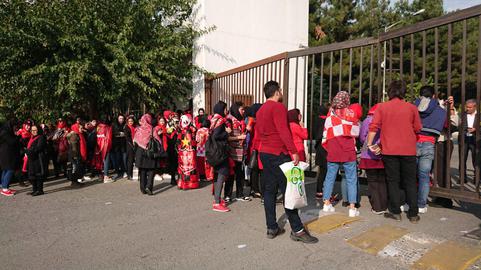

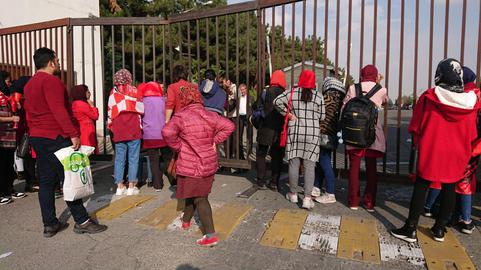
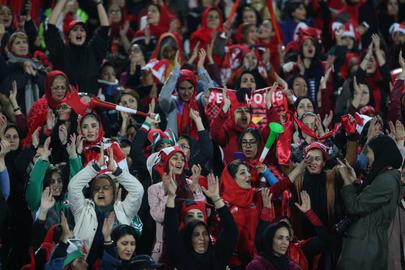
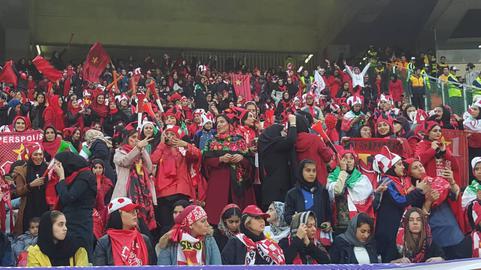
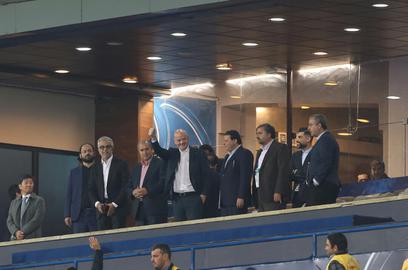

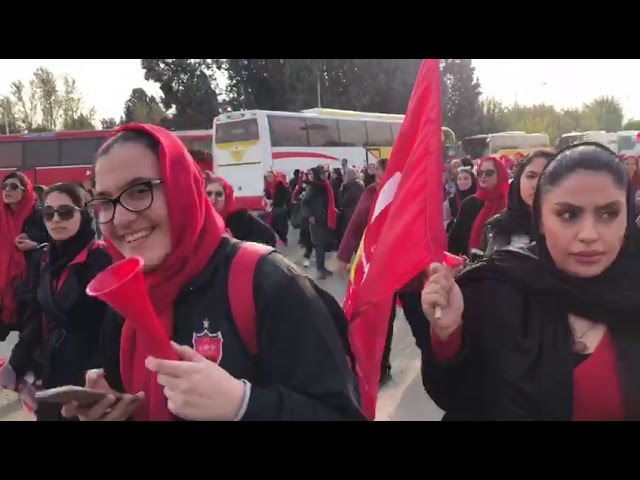
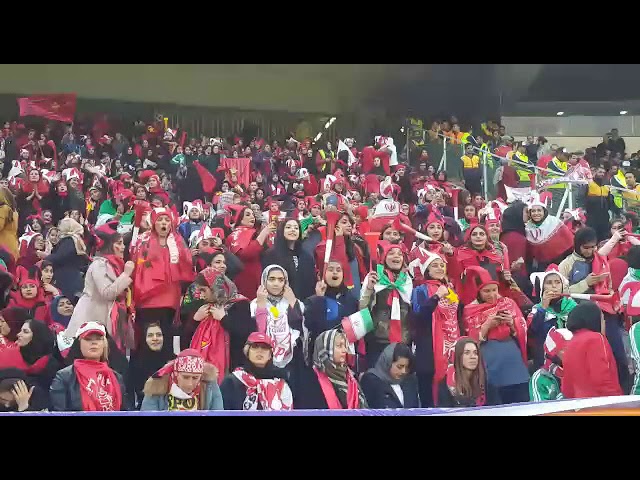




















comments